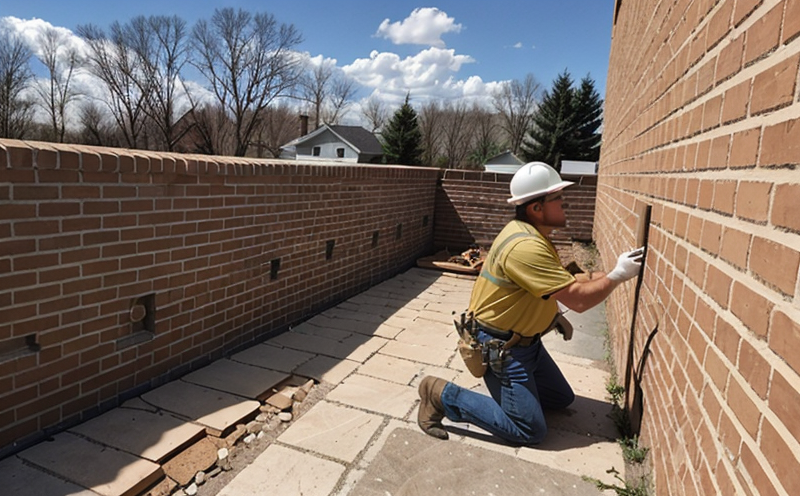Masonry wall inspection
The inspection of masonry walls is a critical component in ensuring structural integrity and compliance with building codes. Masonry construction encompasses various types of materials such as brick, stone, concrete blocks, and other similar products that are bonded together using mortar. The primary goal of this inspection is to ensure the quality and reliability of the masonry work, which directly impacts safety, durability, and longevity of buildings.
The process involves several key stages where specialized testing equipment and techniques are employed:
- Visual Inspection: This initial step checks for visible defects such as cracks, efflorescence, or surface damage.
- Mortar Strength Testing: Using destructive testing methods like the push-out test, the strength of mortar joints is evaluated to ensure adequate bonding between units.
- Compressive Strength Testing: Individual masonry units are tested under compressive loads to determine their load-bearing capacity.
- Thermal and Moisture Resistance: These tests assess how well the wall resists changes in temperature and moisture levels, which can affect its performance over time.
The inspection also involves detailed documentation of findings, including photographs and reports that serve as a basis for any necessary corrective actions. Compliance with relevant international standards such as ASTM C1026, EN 772-3, and ISO 14592 ensures consistency and reliability across different jurisdictions.
For quality managers and compliance officers, regular inspections are essential to maintain regulatory adherence and ensure long-term performance. R&D engineers can leverage this data for improving design and construction processes. Procurement teams benefit from this service by ensuring the highest quality materials are used in their projects.
Quality and Reliability Assurance
Masonry wall inspection plays a pivotal role in maintaining high standards of building quality, reliability, and safety. This section focuses on how we ensure that our inspections meet these stringent criteria:
- Standard Compliance: All inspections are conducted according to international standards such as ASTM C1026 for push-out tests, EN 772-3 for compressive strength testing, and ISO 14592 for thermal and moisture resistance.
- Accurate Data Collection: Our team uses advanced instrumentation and techniques to collect accurate data points that reflect the true condition of the masonry walls.
- Comprehensive Reporting: Detailed reports are generated following each inspection, providing a clear picture of the wall's condition. These reports include recommendations for any necessary repairs or enhancements.
- Repeat Testing: For critical structures, repeat testing is conducted periodically to monitor changes over time and ensure ongoing compliance.
The combination of these measures ensures that every inspection is thorough and reliable, giving stakeholders peace of mind regarding the structural integrity of masonry walls.
International Acceptance and Recognition
- ASTM C1026: Push-out test for determining mortar strength.
- EN 772-3: Standard method of testing compressive strength of products used in masonry structures.
- ISO 14592: Specification for thermal performance of building constructions.
- AS/NZS 3666: Australian/New Zealand standard for the use of lightweight concrete blocks and units, including testing methods.
- BS EN ISO 772-4: British Standard for compressive strength testing of concrete masonry units.
- CNEN 15368: Chinese National Standard for the inspection of building structures.
The service provided by this laboratory is recognized and accepted in many countries, ensuring that the results are valid and reliable across different regions. Compliance with these standards ensures that our inspections meet international quality benchmarks.
Use Cases and Application Examples
| Scenario | Description | Test Parameters | Results |
|---|---|---|---|
| New Construction Quality Assurance | Detailed inspection of newly built masonry walls to ensure compliance with design specifications. | - Compressive strength testing of blocks - Mortar strength testing using push-out test - Thermal and moisture resistance assessment |
Wall meets or exceeds all specified standards, ready for occupancy. |
| Retrofitting Existing Buildings | Evaluation of existing masonry walls to assess their condition before any retrofitting work. | - Visual inspection for visible defects - Non-destructive testing using ultrasonic methods - Destructive testing on samples taken from the wall |
Recommendations provided for necessary repairs and improvements. |
| Structural Integrity Checks | Ongoing checks to ensure that masonry walls maintain their structural integrity over time. | - Periodic compressive strength tests - Monitoring of thermal and moisture resistance performance |
Continuous compliance with standards is maintained, ensuring safety and longevity. |
| Forensic Investigations | Investigations into the cause of structural failures or unexpected damage to masonry walls. | - Detailed destructive testing - Analysis of failed specimens using advanced microscopy techniques |
Identification of root causes, leading to effective remediation strategies. |
The service provided by this laboratory is versatile and applicable across various scenarios, ensuring that masonry walls meet the highest quality standards in both new construction and existing structures.





